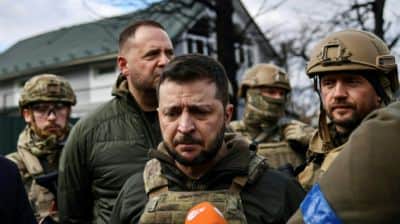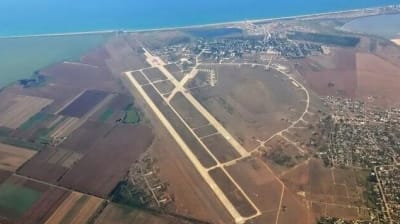58% of Ukrainians stand for continuing to fight Russia, even without Western help – infographic
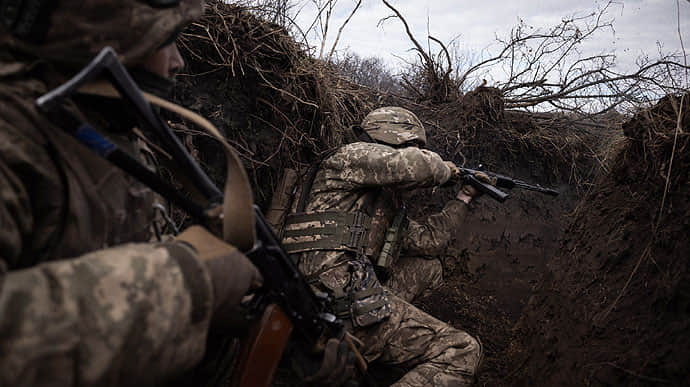
Over half of Ukrainians believe that, given a significant reduction in aid from the West, Ukraine must persist in defending itself from Russian aggression, even if it involves the risk of losing new territories.
Source: results of a poll conducted by the Kyiv International Institute of Sociology (KIIS) from 29 November to 9 December
Quote from KIIS: "The majority of respondents - 58% - are now inclined to believe that even if Western aid is drastically curtailed, it is still worth pursuing the war effort to exert pressure on the Russian occupying forces, taking into account the risks to the territories Ukraine presently controls."
Details: However, every third respondent (32%) believes it is better to agree to cessation of hostilities under conditions of genuine security guarantees from the West, including if the liberation of the Russian-occupied territories is dragged out indefinitely.
The remaining 10% failed to make up their minds.
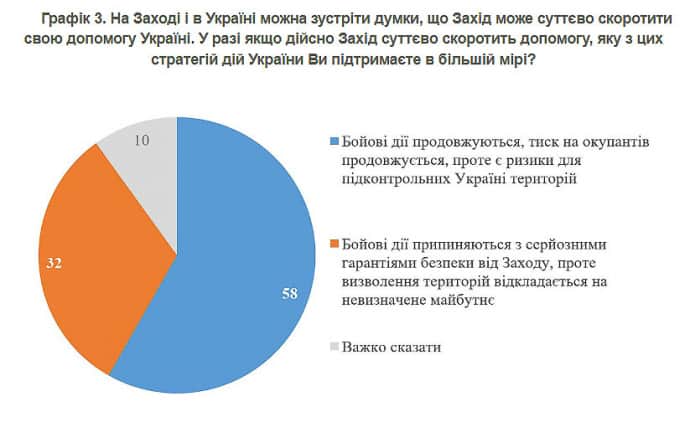
Blue: The fighting must persist, and pressure on the Russian occupying forces must be kept up, but with risks for the Ukrainian-controlled territories.
Orange: The fighting is stopped with solid security guarantees from the West, but the liberation of the Russian-occupied territories is postponed for an indefinite future.
Grey: Hard to say
For reference: In view of the high risk of a significant decline in support from the West, KIIS asked Ukrainians which strategy would be better for Ukraine:
- stop fighting, maintain control over the liberated territories and receive solid security guarantees from the West or even NATO membership, but postpone the liberation of the occupied territories for an indefinite future;
- to carry on fighting, put pressure on the Russian occupying forces and look for their weaknesses, gradually and slowly liberate Russian-occupied territories, but at the same time realise that there is a threat to the Ukrainian-controlled territories.
Sociologists point out that there are certain regional distinctions when it comes to the action plan, should Western aid be substantially curtailed. More respondents in Ukraine's West and Centre (64% and 65%, respectively) are in favour of continuing the fighting in any case. However, in these regions, a quarter of the population also supports the cessation of hostilities.
Instead, opinions in Ukraine's South and East are split roughly in half, with only a slight predominance of those in favour of continuing hostilities.
In particular, 46% in the South and 47% in the East believe that the fighting must persist even with limited Western assistance. In contrast, 40% and 42%, respectively, are ready for the hostilities to end.
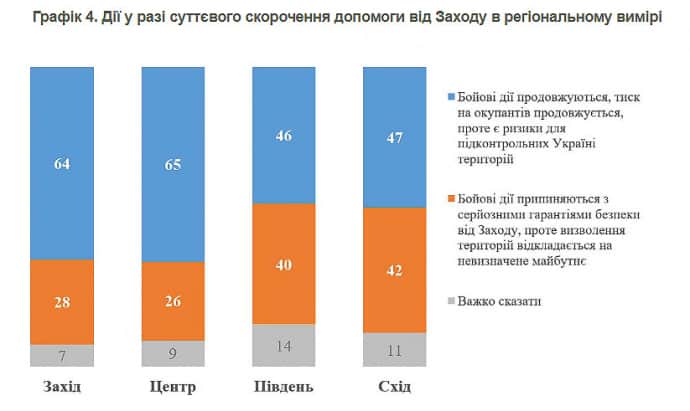
Blue: The fighting must persist, and pressure on the Russian occupying forces must be kept up, but with risks for the Ukrainian-controlled territories.
Orange: The fighting is stopped with solid security guarantees from the West, but the liberation of the Russian-occupied territories is postponed for an indefinite future.
Grey: Hard to say
Sociologists noted that proximity to the contact line plays a significant role in this case. The south and east are much closer to the war zone, which largely determines the higher readiness to end hostilities in the face of limited aid.
The study was conducted from 29 November to 9 December. A total of 1,031 respondents living in all oblasts of Ukraine (except the Autonomous Republic of Crimea) were interviewed using telephone interviews based on a random sample of mobile numbers. The survey was conducted with adult (aged 18 years and older) citizens of Ukraine who, at the time of the survey, lived on the territory of Ukraine (within the limits controlled by the Ukrainian authorities until 24 February 2022). Residents of the temporarily occupied territories could not be included in the sample, and the survey was not conducted with citizens abroad.
Formally, under normal circumstances, the statistical error of such a sample (with a probability of 0.95 and taking into account the design effect of 1.1) did not exceed 3.4% for indicators close to 50%, 3.0% for indicators close to 25%, 2.1% for indicators close to 10%, and 1.5% for indicators close to 5%.
In times of war, a certain systematic deviation is added in addition to the specified formal error. However, sociologists are convinced that the results obtained retain high representativeness and allow for a fairly reliable analysis of public sentiment.
Support UP or become our patron!
